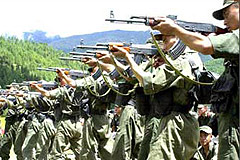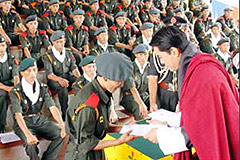 |
| The
Bodo & Ulfa Problem |
 |
 |
 |
Bhutan Bodo & Ulfa Conflict |
|
|
 |
September
2003: India
and Bhutan are in close cooperation on militant problem
|
 |
|
Bhutan's
militia at Training |
|
India
and Bhutan share a serious security concern. As the highest leaders of
the two countries held close consultations during His Majesty the King's
state visit to New Delhi . |
 |
|
Prince
Dasho Khesar joined militia meeting |
|
As close friends and allies, they would not
allow their territories to be used by anyone for carrying out activities
that were harmful to each other's national interests.
During
HM's meetings with India's President, Prime Minister , Deputy Prime Minister,
ministers, government officials and the Indian army chief His Majesty the
King briefed them on the presence of the ULFA and NDFB militants from Assam
and the KLO from West Bengal. 99 percent of the rations for all the camps
inside Bhutan as well as weapons and equipment were being brought across
the border from West Bengal and Assam.
Having
come illegally into the country because of problems in their own states,
the ULFA had secretly established nine camps, the NDFB eight camps, and
the KLO four camps without the Bhutanese government being aware of these
developments.
 |
"Having
come illegally into the country because of problems in their own states,
the ULFA had secretly established nine camps, the NDFB eight camps, and
the KLO four camps without the Bhutanese government being aware of these
developments". |
 |
"The
continued presence of these armed militants undermines Bhutan's security
while their goals and activities in Assam and West Bengal are a threat
to India's peace and territorial integrity". |
 |
"Our
policy has always been to try and resolve the problem through a process
of dialogue, not only because it is the best way to solve any problem,
but because it is very important for Bhutan to maintain good relations
with Assam and West Bengal". |
 |
"We
want them to close down the camps and leave our country. We would really
like to give the process of dialogue a good chance to succeed". |
 |
What
is important for all of us to understand is that the government of India
and the government of Bhutan have been working very closely together, and
we have been working very hard, over the last few years to resolve this
problem. |
 |
Although
the media gave the impression that the militants were living in the towns
and villages of Bhutan, the truth was that they were camped deep in the
dense jungles with their locations strategically selected. It was not possible
for anyone to police the rugged terrain with its steep ridges, tropical
forests, and many rivers.
While
the press had reported that the government had turned a blind eye to the
presence of the militants and had not taken any action against the militants,
His Majesty pointed out that the government of Bhutan had invested substantial
funds and taken concrete actions on the issue.
In
six years the Royal Bhutan Army had established 20 army camps along the
Assam-Bhutan border and posted 5,000 trained troops. Trade, industries,
even entire towns inside Bhutan were closed, bringing economic development
to a standstill and creating much hardship for the people. The sale of
all goods to the militants had been banned and Bhutanese people helping
the militants in any way were being punished under the national security
Act.
| National
Assembly of Bhutan: Last attempt |
 |
In
August 2003 the National Assembly took a decision to make one last attempt
to invite the leaders of the ULFA, NDFB, and KLO militants for talks. The
Bhutanese government had already sent written invitations to the militant
leaders to come to Bhutan for talks. |
The
Royal Bhutan Army had always received very close cooperation and assistance
from the Indian army. On the militant problem, it was particularly important
to maintain close links because Bhutan enjoyed excellent relations with
the government of India, the RBA had very close cooperation with the Indian
army, and also because the militants came from India.
|
Bhutan Maps
|
 |
|


